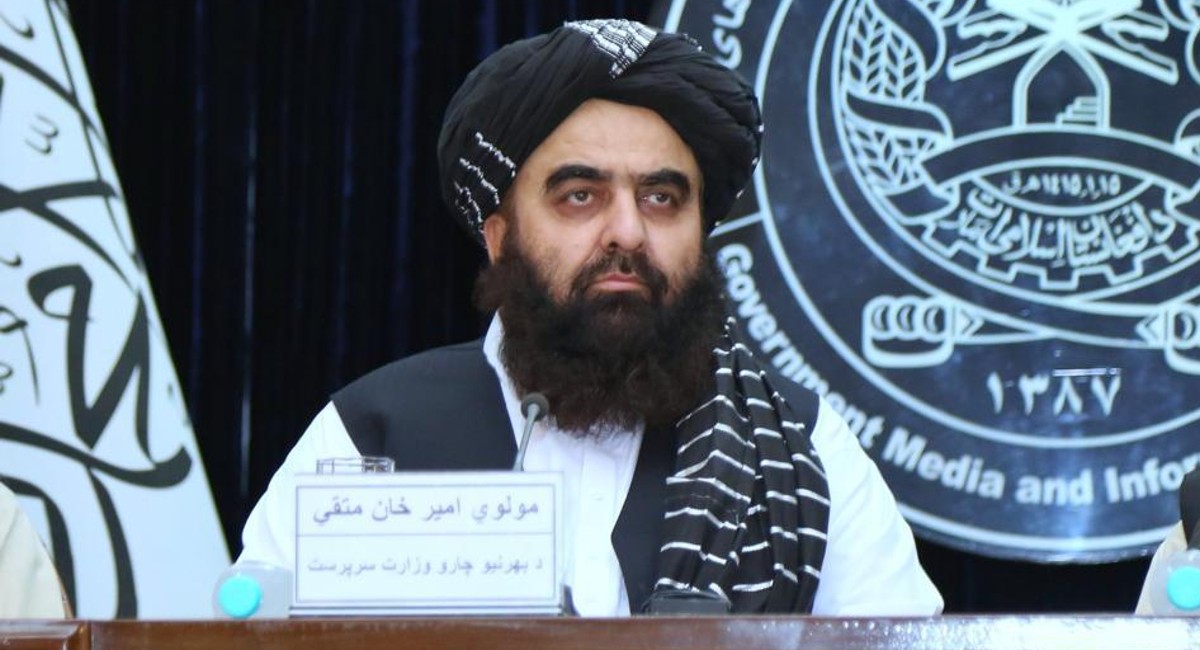Taliban’s acting foreign minister Amir Khan Muttaqi said at an event in Kabul on Monday they’re committed to the 1973 treaty Helmand River Water Treaty with Iran, but insisted that Afghanistan is facing a drought and that there is a lack of water in Kamal Khan and Kajaki dams in Nimroz and Helmand provinces, respectively.
Muttaqi asked Iran to adjust its “expectations” based on the 1973 treaty and that “it should not politicize” the issue.
He said the issue should be resolved through talks.
“The Islamic Emirate of Afghanistan (Taliban government) is committed to the 1973 treaty,” Muttaqi said. “We expect the Islamic Republic of Iran to adjust its expectations based on the 1973 treaty and judgments should be based on the agreement.”
“We ask the Iranian government not to politicize the vital issue of water and it is better to address such issues through understanding and face-to-face talks instead of creating buzz on the media,” Muttaqi added.
This comes as Iran’s speaker of parliament said on Sunday, May 21, that Tehran will not compromise on the Helmand River Water Treaty and called for the Taliban to abide by the agreement and supply Iran with its rightful allocation of water.
Addressing a session of parliament, Mohammad Bagher Ghalibaf said the complete and accurate implementation of the agreement on the Helmand River conflict guarantees the mutual interests of Iran and Afghanistan. There will be no compromise on this vital issue, he stressed.
“I would like the Afghan authorities to respond constructively to the positive will of the Islamic Republic of Iran in this regard and to prevent the occurrence of a serious problem between two countries,” Ghalibaf warned.
Tempers are simmering in Iran over the issue, and a number of officials have reacted to a Taliban video they claim ridicules the situation.
This week, a video emerged on various social media platforms of a Taliban official, by the name of General Mobin, filling a yellow drum with water from a reservoir. “I want to give water, so Iran’s president does not launch a military attack, we are afraid,” he says in the video.
Meanwhile, on Saturday, Iran’s special envoy and its acting ambassador to Afghanistan, Kazemi Qomi, gave the Taliban one month to resolve the situation.
The Taliban has repeatedly said it is willing to cooperate with Iran but claim there is not enough water in the Helmand River for Iran.
Qomi said in a TV interview that should Tehran find there is water and the Taliban do not supply his country with it, Iran will take action.
On Friday, President Ebrahim Raisi warned the rulers in Afghanistan not to violate the water rights of the Iranians, stressing the government is determined to defend the nation’s rights.
Also on Friday, Iran’s foreign ministry “strongly refuted” Taliban’s claim over lack of water in the Helmand River, while Iran’s energy minister Ali-Akbar Mehrabian said the same day that the government is determined to pursue Iran’s water rights according to the 1973 treaty.
The treaty states that Iran is entitled to 820 million cubic meters of water from the river annually, but Qomi said earlier in the week that it has only received 27 million cubic meters.
Foreign Minister Hossein Amir-Abdollahian also accused the Taliban government in a tweet this week of not allowing Iranian experts to investigate the matter in Afghanistan despite his repeated requests. “Proof of existence or lack of water is technical and actual visit [by experts], not a political statement [by the Taliban],” he wrote.
On Thursday, the spokesman of Iran’s Aerospace Organization, Hossein Dalirian, said in a tweet that images from Iran’s Khayyam satellite indicate that the Taliban has stopped water from reaching Iran by changing the course of the river in some areas and building “numerous” barriers.
While Afghanistan says it needs dams to store water for agriculture or to produce electricity, which it imports from neighboring countries including Iran, many environmentalists are critical of large-scale water engineering projects.
Wetlands in Sistan have largely turned into salt flats, the once-rich wildlife has disappeared, and many local villages abandoned. In 2019, after nearly two decades of drought, water from Helmand reached the wetlands of Sistan and partially revived the Hamoun-e Hirmand Lake. The lake is a UNESCO biosphere reserve.
Helmand River rises in the Hindu Kush before flowing west into Iran and feeding the wetlands in the Sistan region including Hamoun Lake. Iran has not always received this amount – in 1999, for example, the Taliban turned off the flow completely.




